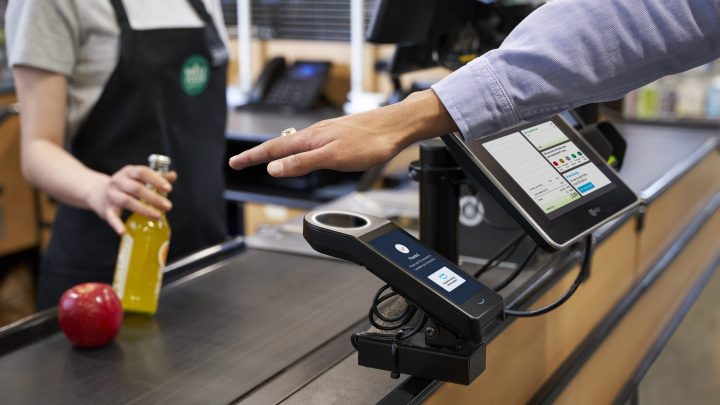
No, I’m not saying “Bye.” I’m saying “Buy.”

Before there was money, there were hands — you just handed over the barley in exchange for the goat (or whatever people bought back then).
The first currency we know of was the Mesopotamian shekel, in circulation around 2150 B.C. The birth of the check is debated, but it may have been in the early 1500s in Amsterdam. The credit card was invented in 1946 in Brooklyn, New York. PayPal came along in 1999, Apple Pay in 2014. And in 2020, we returned to the hand.
In September of that year, Amazon launched Amazon One, a system that enables you to make purchases by waving your hand. There’s no embedded chip, just wave your hand above or below a scanner. It’s now in use at Amazon’s Whole Foods chain.
Marketplace’s Sabri Ben-Achour was joined by Wall Street Journal technology reporter Christopher Mims to discuss the adoption of this palm-scanning tech and the larger topic of business opportunities around biometric data collection.
Sabri Ben-Achour: How does this work exactly?
Christopher Mims: Amazon has this sensor that takes a picture of your hand and also kind of peers through your hand, and it comes up with a unique biometric, which is just a sort of digest of what your hand looks like. Then it links that to your identity and your credit cards.
Ben-Achour: As they say, if you don’t pay for the product, you are the product. Like, what is the business model here?
Mims: I think the business model here for Amazon is they ultimately want to own that customer relationship the way that Google or Apple has tried to with Apple Pay or Google Pay. So that data is definitely valuable. But you know, in the future, you could see them using it to help promote their own in-house credit card, for example.
Ben-Achour: Because you’d also have to get the businesses to install a hand reader next to their credit card reader.
Mims: Yes, and that is hard. I mean, we all remember how long it took for businesses to install payment terminals that accepted contactless payment. Even with the carrot of the contactless era during the pandemic, it took businesses a long time, so that’s a bit of a reach for a lot of them. One place you might see this show up sooner could be, for example, to control entry into buildings. So you might wave your hand to identify yourself before you go into work.
Ben-Achour: If Amazon has a scan of your hand, it has biometric data. How is that data stored? And how might it be used? And how might it be protected?
Mims: Amazon insists that they’re storing just this encrypted abstraction of your hand — their sensor just looks at your hand, extracts the relevant features and then just stores that as some gobbledygoop that only Amazon can understand. So that’s one of the ways that they claim they’re making this more secure. It’s not like certain things we’ve heard about — face recognition, where they were really just based on these databases of recognizable faces that can be exploited in all kinds of ways.
Ben-Achour: I mean, is Amazon alone in trying to do this, or is there actually an ecosystem of startups trying to get into this world?
Mims: There’s a huge ecosystem of companies working on identifying us with parts of our bodies. So, Apple’s new Vision Pro headset identifies users with an iris scan. If you want to travel to Europe, because there are a lot of places in the EU now where you’ve got to submit to some kind of biometric face scan. Then, there are other folks trying to work on payments with hands. Companies like Fujitsu have been working on this for decades. And the other day, I saw someone was trying to make it work for vending machines. So you imagine, you know, your kid enrolls and then every time they walk by a vending machine at their school, they’re just like, “I want a Coke!” And they wave their hand.
Ben-Achour: That so dangerous for the parents’ wallets. Do you think this has a real chance of taking off?
Mims: I think in the long run, it will take off because we will just become accustomed to the convenience of the world around us just instantly identifying us as who we say we are and not having to present, you know, a drivers license when you want to buy, like, alcohol or tobacco, let’s say. Not having to pull out a swipe card when you want to get into a building at work, not having to even have your phone or your credit card with you when you want to make a quick purchase at a coffee shop. It just feels so convenient that once people get used to it, they’re not going to want to go back.
There’s a lot happening in the world. Through it all, Marketplace is here for you.
You rely on Marketplace to break down the world’s events and tell you how it affects you in a fact-based, approachable way. We rely on your financial support to keep making that possible.
Your donation today powers the independent journalism that you rely on. For just $5/month, you can help sustain Marketplace so we can keep reporting on the things that matter to you.

















